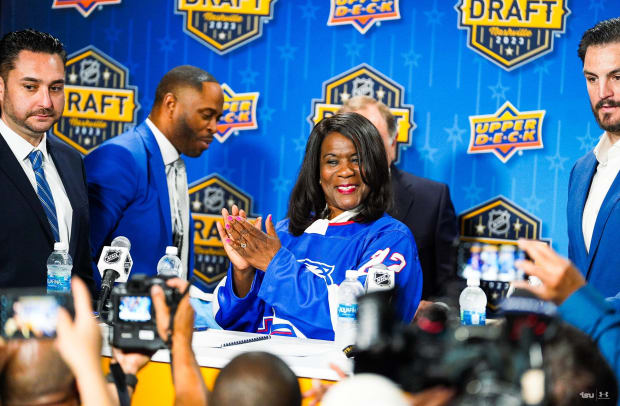HBCU Ice Hockey Launches At Tennessee State
A new frontier in HBCU sports launched when Tennessee State announced its new ice hockey program at Bridgestone Arena on Wednesday, June 28.
"This is one of the most exciting days for ice hockey. This is an ideal setting as we announce that Tennessee State University will offer men's ice hockey at the collegiate level and will be the first HBCU to do so."
Director of Athletics Mikki Allen, NHL Vice President Kevin Westgarth, and Anson Carter, a former NHL player turned analyst on TNT, accompanied Dr. Glover at the press conference for the historic announcement.
Bringing hockey to Tennessee State has been a collaborative effort between the university, the National Hockey League, and the league's local team, the Nashville Predators. It started back in 2017 when the NHL began conducting feasibility studies to evaluate and possibly establish men's and women's collegiate hockey programs.
In 2021, Tennessee State University conducted a feasibility study to introduce hockey to the HBCU sports world. The university fostered relationships with the Predators, which involved raising scholarship funds and organizing a Black Hockey History Tour at Hale Stadium.
Two years later, the vision became a reality. "Adding ice hockey to our programs will start a new chapter and build upon that. Our hockey program will create a new sports community within TSU," Glover said. "One that is more inclusive, more diverse as we ignite a new interest in the sport.
"It is our hope that while TSU is the first HBCU to start an ice hockey program, we certainly won't be the last." The men's ice hockey team will start as a club program with the goal of becoming a Division I or Division II program in the next few years. Allen provided more specifics on the potential timeline to achieve that status.
"2024-2025. With the launch of our club hockey program, we'd love to be in the D-I or D-II space in 2026 or 2027," Allen said. "But we're working hand in hand with College Inc., again, the Nashville Predators and NHL, on creating a realistic timeline. And so those are the years that we're targeting. You know, we will we'll continue to forge hope."
There are some logistical matters Glover and Allen want to resolve, starting with finding someone to oversee the hockey program. Currently, Nick Guerriero manages it on an interim basis. He is the Assistant AD for Communications and Creative Content.
"The first plan of action is to get someone in place that has deep roots in grassroots hockey, from a recruiting perspective, and also someone that can fundraise and connect," Allen said. "So we're in the process of hiring a Director of Club Hockey that will take on this task and work hand in hand with our partners."
Additionally, Allen mentioned in-state schools Vanderbilt, Belmont, and Tennessee as teams to compete against, along with Louisville and the University of Kentucky.
"We feel that from a geography standpoint, traveling they're really reasonable in terms of competition. And those would be schools that come to mind," Allen remarked.
However, another factor is more complex than solving logistical concerns; building interest in a demographic that is the overwhelming minority.
There have been great Black players in league history, from the NHL's first Black player, Willie O'Ree, to the Minnesota Wild's Ryan Reaves, to retired player P.K. Subban, who spent part of his 13-year career in Nashville.
Subban is also part of the Player Inclusion Coalition, a group of current and former NHL players and professional women's players that will work to advance equality and inclusion in hockey. He serves as a co-chair alongside Carter.
"P.K.'s excited. He was supposed to be here, but he got caught in travel due to the weather," Carter said. "Many folks in the coalition got stuck in their respective hometowns, but he's ecstatic. He's not a college hockey guy who played major junior hockey in Canada, but he understands what HBCUs mean. And he also understands what hockey means here in the city of Nashville and the state of Tennessee, so he's thrilled with what's happening with TSU. He's been very supportive of TSU hockey."
Still, it's an inherent challenge to pioneer a new path. The Tigers' program will charter untested waters in a sport with very little Black representation in the HBCU sports landscape. But the good news is that Tennessee State will not tackle this alone with the NHL supporting the school.
The program couldn't have asked for a better start, and if Dr. Glover has her way, it'll be the blueprint for more to follow.
